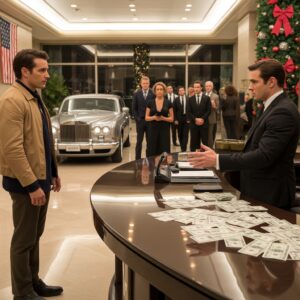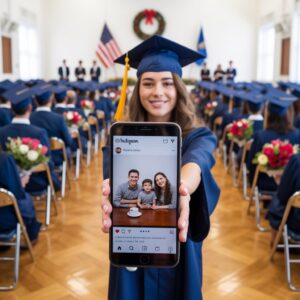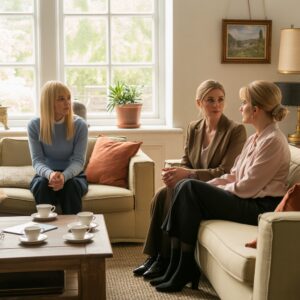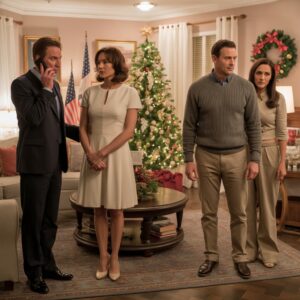Alexander Harrington would have laughed and made a cutting comment if anybody had told him a youngster with a tattered shirt and a plastic stethoscope would change his life. But that’s how it started.
Alexander disliked parks, particularly Sundays. He hated this one—the commotion, the popcorn smell, the youngsters running too near to his wheelchair.
Their enthusiasm, vitality, and independence irritated him. He sat alone under a sycamore tree, silent yet powerful. His guard softly pulled the people back 20 meters.
He had been immobile for five years due to a stroke. Right side paralysis followed left side. He could still think, communicate, and—most importantly—judge. He used that expertise like a sword.
What’s this crap about? Snorting, he glared at the kids.
We’re physicians! a girl with vivid pigtails and a toy clipboard said happily. “We save lives!”
“Saving?” he said coldly. Everyone dies. Especially if you treat others as poorly as you dress.”
The laughing stopped. Some youngsters retreated. One whimpers. A single youngster resisted. A little, bareheaded man, he was serious beyond his age. He held a crimson toy stethoscope on his neck like it was real.
“Do you want to get better?” the child asked Alexander, looking at him.
“You?” Alexander laughed cruelly. Best hospitals in the world couldn’t assist me. Think you can—for a cookie?
“No,” the kid said quietly. “One million dollars. Walking after my treatment costs you. If not—nothing.”
Despite himself, Alexander watched eagerly. He saw con artists, fanatics, and insane. He would later discover Luke had something else. A calm assurance. Too much quiet for a youngster.
“And how will you handle that?”
“You have to trust me,” Luke responded. It’s the rule. Allow me my routine. Avoid laughing. Do not interrupt. “Just trust.”
Alexander grinned. His bodyguards seemed suspicious. Someone whispered, “Should we step in, sir?”
“No. Let him try. Find out what fraud this is. So we report him.”
Luke took a shoebox from his rucksack. Ribbon, a stone, and an antique picture were within. He gently placed them on the grass, mumbled to himself, and moved his hands slowly. Alexander was weirdly captivated.
Luke put his warm hand on Alexander’s. He responded, “It’s done. You’ll stroll tomorrow. Never forget the million.”
Luke quietly packed things and left the park, disappearing into the woods and collapsing houses.
A guard laughed. “Brilliant. Not even tried.”
Alexander laughed, but he felt uneasy. He fell asleep in his typical gloomy attitude on his sterile, high-tech bed at home.
The anguish followed. However, this anguish was unique. Like cramps?
He blamed the meds—until he glanced down. His right toe twitched. Twitched again.
He concentrated. Another flicker. He was shocked. Called his nurse. Then his doc. An full medical staff.
Instead of wrath, his hands shook with astonishment. Alexander stood for the first time in five years hours later. Stands unsteadily, supported.
“This isn’t medically possible,” his neurologist said. “Your spinal cord was severed. None can explain this.”
“It’s not a miracle,” Alexander muttered. It’s debt.”
Luke’s voice came to mind. That odd confidence. Tomorrow you walk. And he had.
The child who cured him had to be found.
He dreamt about running that night. Shaky dash, lungs burning—no pain or paralysis, just a little shadow with a boy’s face.
Next morning, sunshine came in rudely, as if it knew this day mattered. Ten agonizing steps to the chair, no sprinting. Hard-earned each. Real.
Change permeated his essence. Doctors couldn’t explain. Scans revealed no miracle. His ailment persisted. Something started to heal. They dubbed it spontaneous neuroregeneration. A disguised miracle.
Alexander knew better.
He returned to the park the following day. No entourage. No wheelchair. Simple gray coat with cane. It was the same bench where he waited.
He asked the playing kids, “Where’s the boy?” He has a crimson stethoscope. Luke.”
They seemed confused. Shook their heads. Nobody remembered.
Alexander returned regularly. His recuperation was public, so reporters flocked. He disregarded them. Not after headlines. He pursued Luke.
A scruffy guy in a smoky cloak sat alongside him on a chilly afternoon while leaves rustled.
“You’re looking for him,” he said.
Alexander squinted. “Luke. You know where he is?
“I saw him. Helped someone—like you. He was near an ancient city school last I heard. A shelter, maybe. Leaky roof. A forgotten place.”
“Address?” Alexander asks.
The guy donated. Alexander took cash. He refused. “Keep it. Powerful men should seek healers, not just servants.
This place appeared abandoned. Graffiti, shattered glass, weeds. A fading sign stated Demolition Scheduled. Inner laughter, sounds, life.
He intervened. The air smelled soupy. Plus something soft.
Drawings covered walls. He first spotted her—an old lady with a scarf, worn face, sympathetic eyes.
Looking for a guy. Luke.”
She hesitated. Nodded. “You’re Mr. Harrington.” He nodded quietly.
“He predicted your arrival.”
“Where’s he?”
“Outside. He’ll return.”
A wall of before-and-after images of houses, families, and memories was shown.
He froze at one. Logo of his firm.
“These buildings…
“Yes,” she replied. “Torn for your project. Our displacement. No warning. No assistance. We didn’t protest. Tired. But Luke stayed.”
Words struck like swords. He recalled the encounter. “Just old folks and immigrants,” someone added. He didn’t care. Until now.
He was rescued by a poor kid, not fortune.
Luke appeared. In the entrance. Calm. Serious.
“I knew you’d come,” he said.
Why you did it? Alexander’s voice broke.
“Because you were alone,” the youngster said. One person isn’t a sentence. Occasionally, one person is a miracle.”
Alex didn’t mention the check. Not discussed deals. He approached and said, “Now it’s your turn.”
He felt he valued people, money, and time.
However, traversing broken floors with soup that night, he realized he had never known shame’s cost.
His first move was to arrive. Quiet. Watching.
He brought food. Medicine. Sometimes quiet.
No one forced him out. But no one greeted him either. Remotely, he was regarded. Too clean. Too polished.
Every gaze evoked it. Yet no one trusted him. He accepted it.
When he first mopped, he felt every crack. His legs trembled. Arms scorched. He remained silent.
Luke gave him rag. Quietly. Watched.
One stormy night altered everything. Water soaked a child’s mattress. Luke’s grandma Mary attempted to blanket it.
Alexander removed his coat, scaled the ledge, and anchored a board to block the leak without saying a word.
“You’ll fall,” she said.
“I have. He said there was no lower.
Kids laughed with him, not near him, as he stepped down, soaking and dirty.
He slept on an old hall mattress that night. No pillow. Only a blanket. Also, peace.
Morning tea was provided by Mary. No words. Just a cup.
Now he belonged.
Luke didn’t cheer. I didn’t embrace. Only nodded.
“You always looked down on us,” Alexander replied.
“And what would change?” Luke shrugged. “It wouldn’t return our home. Or Grandpa.”
«I wanted you to witness it»
And he had.
Alexander saw more than rubble—he witnessed aftermath.
The words “Thirty-two homes demolished” used to sound like logistics, not anguish. But suddenly those dwellings were faces. Families. Hallway sleepers. Wearing holey shoes. Teaching reading in drafty classrooms.
Alexander provided fresh winter garments, flashlights, gloves, and a generator every night. No helpers. No press. Just him.
He recognized this wasn’t about charity as he contributed more. Redemption.
Luke inquired one night, “Why don’t you buy everything again? Like before?
“Because before, I built with paper,” Alexander said. “Now I build by hand. Only now do I realize a brick’s value.”
Luke examined him. “Your eyes are different.”
What’s it?
“Life.”
They played cards that night. Alexander lost—but smiled. A genuine giggle. His first in years.
He brought a blueprint the following day.
What’s it? Mary asks.
“A plan,” he said. I wish to rebuild homes. Try the two near the park. Then school. Everyone in the neighborhood.”
“No skyscrapers. Just houses. For people.”
Mary studied him.
“People don’t want palaces. They want stability assurance. You stole it. Want to return it?
“I do,” he said.
He knew rebuilding wouldn’t erase history. It may reconcile with it.
Luke wrote in a notepad beside the window that night. Alexander approached.
“Working on what?”
A list. Those remain in need. The ill. The lonely. Want to locate them.”
“You’re still a child,” Alexander remarked kindly.
“But not clueless,” Luke said.
Alexander developed his own list, beginning with his debtors.
Starting with him.
A dreary morning followed.
No steps. Not boiling tea. No Mary.
Luke noticed first. He knocked and opened her door.
She lay on her side, pallid and breathless. She had dry lips. Dull skin.
“Water,” she whispered.
Luke grabbed it quickly, shaking. She drank. Barely. She closed her eyes again.
Alexander heard in the basement.
Not terror, but something deeper seized his heart.
Love.
“Did anyone call a doctor?”
“Probably her kidneys,” someone whispered. But we have no automobile. Or cash.”
“We do,” Alexander answered. “We go. Now.”
He drove. Luke held Mary’s hand in the back.
“You’ll be okay,” he said. “I’ll help you like I helped him.”
Hospital examinations proved the worst.
“Her left kidney failed. Doctor: The right is close behind. “She needs a transplant. Immediately.”
“I’ll pay,” Alexander said.
It’s not about money. Need a donor. Fast.”
Luke froze. He was overcome with emotion but did not cry. He looked down at his repaired hands.
Why not assist now? He whispered.
Sitting next to him was Alexander. Because Luke, you’re not god. You’re male. Hope came from you. But—this is biology.”
He hesitated. “Maybe it’s my turn.”
Tests showed Alexander was compatible.
“You’re not young,” the doctor warned. You’ll have one kidney. Quite risky.”
“I’m sure,” he replied.
Before surgery, Luke said, “Why are you doing this?”
Alexander looked at him.
Do not loose what I lost. Someone who always loves you. Without compensation.”
“This is not repayment. It matters.”
The surgery worked.
Mary awoke. Smiled at Luke. Kissed palms.
“I knew you were close,” she said.
Luke didn’t correct her. She was aware.
Alexander, exhausted yet content, rested.
Luke gave him an envelope.
What’s this?
A check. $1 million. You gave me. Tearing up.”
Tore it in half. Drop it.
“Why?”
“You can’t buy real acts. It’s free what you did. You say thanks.”
This time, Alexander grinned.
There would be suffering. Now, there was purpose.
He dug new water line trenches three months later.
A nurse shouted, “Be careful!” Do not overdo!”
He chuckled. Donated a kidney. My arms will last.”
Thinner. Slower. Grayer. His every move was meaningful.
Old school was changing. Rising.
The Mary Institute.
A refuge. A school. Hope—not simply information.
Alex worked with everyone. Bringing supplies. Painting. Fixing lighting.
He was no longer “Mr. Harrington”. Uncle Alexander.
He distributed sweets. Told tales. Laughed.
A child inquired, “Were you really a billionaire?”
“I was,” he said. “Now I’m something better—a person.”
Sold his mansion. Bought a nearby tiny flat. Self-cleaned. Made his own food.
Luke matured. Notebooks, glasses. Dreams.
Alexander paid for his medical schooling.
Luke addressed a throng during the Institute’s opening.
“I once pretended to be a doctor,” he remarked. I said I could heal him. I doubted I could. But I believed.”
He surveyed the crowd.
He cured me. Not my body. But by his actions.”
He preached built-in redemption.
Using hands. With options. In love.”
“I want to help others as I was helped.”
Alexander wore plain attire on the first row. Eyes sparkled. Luke descended and embraced.
“You’ll always be the one who saved me,” he muttered.
Nothing much to say.
Final stop—the same park.
Alexander sat under the sycamore. Children played doctor nearby. Luke watched over them.
Little girl fled.
Uncle Alexander, have you seen a doctor?
He grinned. “Yes. The best.”
“Who?”
“The one who healed soul—not body.”
He shut his eyes. Inhaled summer.
Laughter. Wind. Warm.
Once, he had everything.
He had what mattered.
Your bank account doesn’t hold legacy. Leave a legacy of kindness to those who carry your light forward.





